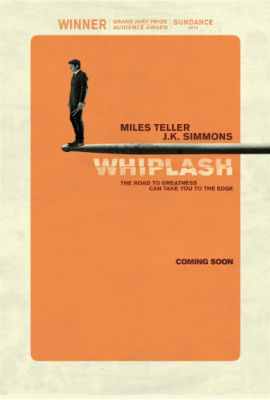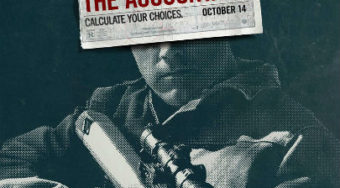Film Reviews

Whiplash
Genre: Drama
Director: Damien Chazelle
Cast: Miles Teller, J.K. Simmons, Melissa Benoist, Paul Reiser, Austin Stowell, Nate Lang, Max Kasch, Damon Gupton
MPAA-Rating: R
Release Date: October 10th, 2014
To call Boyhood audacious is an understatement. Many who call it that are referring to the twelve years it took to make the movie. Not twelve years of paperwork and bureaucracy and getting the rights to the story but twelve years of actual film-making. The film was shot over the course of a dozen years, sales with the main actors returning to their roles once a year in an a grandiose attempt to capture one child’s fictional growth.
The word audacious, look though, case should refer to something more than the time span.
It should refer to director Richard Linklater’s immense attempt to capture the changes— physical, psychological and emotional— of growing up.
The year 2013 was a great one for movies about young people. The Spectacular Now told the story of a young man waving away his reckless ways and growing into an adult with the support of a forgiving girlfriend. The Way, Way Back focused its lens on a boy struggling to come out of his shell at a time when his mother’s boyfriend was emotionally hindering his growth. The Kings of Summer, meanwhile, focused on two best friends (and their mischievous ally) who escape their parents’ cloying neediness and build a house in the woods. Each of those 2013 films captured a specific time in the lives of these young characters.
Boyhood is different. It doesn’t attempt to capture one specific event in its protagonist Mason’s (Ellar Coltrane) young life. It tries to capture the whole thing, showing how Mason— along with his parents and his sibling—grew over the course of twelve years. It doesn’t show all of Mason’s birthdays along the way— who would remember all of them anyway?— but rather it depicts the small but beautiful moments that subtly but importantly defined his childhood.
The moment he paints over the height measurements in his mother’s home. The times he spends eating French fries and bonding with his often-absent father. The day he feigned sickness to avoid going to class because he didn’t like the haircut his vicious stepfather forced him to get.
When such moments occur, they are vividly important and burn themselves into Mason’s memories (as similar moments likely burned themselves into our own memories). These are small but integral moments that often foreshadow who we become as adults. Speaking of adults, Mason’s Mom (Patricia Arquette) and Dad (Ethan Hawke) are major players in Mason’s upbringing (as they should be) and as Mason grows, so do they.
Arquette, doing phenomenal work as a tough but vulnerable mother trying to get a better education for herself, makes many mistakes in her life but she’s constantly growing through them. Hawke has a smaller role but a clearer character arc, beginning the story as an absentee father unsure of his own place in life. Should he settle down? Is life on the road all that he wanted? Will his musical career ever pan out? He doesn’t know and in the course of the drama, there’s no one major moment when he decides who he wants to become. There’s no epiphany for his charming but seemingly-lost character. There’s just a sense that he’s slowly growing from being an immature and lackadaisical father to being one who offers a meaningful presence in its children’s lives.
In life, personality changes are subtle and we don’t see people change dramatically from one day to another but we know that they are changing. That’s what happens to Mason’s dad in the film and to all of the other major characters here. Over twelve years, they grow physically but more importantly, they grow as people and this film captures that subtle growth from the eyes of a boy, who slowly grows into a man.
Boyhood may have started as an experiment in film-making but in scene after scene, it— like the characters it depicts— grows into being so much more. It’s the best film of 2014.
Whiplash, remedy
despite its focus on a large jazz orchestra, more about
is really only about two people. Other characters exist around them but only in the periphery. The existence of relatives and friends here only serves to show the world in which the two main characters—jazz drummer Andrew (Miles Teller) and instructor Terence Fletcher (J.K. Simmons)— live in.
Both the teacher and the student surround themselves with music. At the Shaffer Conservatory, medicine
Andrew is a first-year student who wants, in his words, to be “one of the greats.” Fletcher is a teacher who wants to squeeze greatness out of his students, like a doctor squeezes blood out of a begrudging patient. “There are no two words in the English language more harmful than good job,” he states as if that sentence serves as a coda for his whole existence (it practically does). Through his stridency, Terence towers over his students and even the other professors in the school, who stand down whenever he loudly enters the room. If he didn’t care about his orchestra, he would argue, or the music that exudes from the instruments, he wouldn’t be so undeniably cruel to everyone around him.
He is so despicably monstrous that when he’s chastising one student, all of the others look away in fear. They know what it’s like to be a victim of his cruelty and to witness it with your own eyes would be like jumping into a deadly flame burning nearby. That being said, his encouragements— though subtle— are more powerful because of that.
When he nods in approval to his students, he’s acknowledging that not only are they doing a “good job.” They are doing a brilliant one.
Writer/director Damien Chazelle builds an intimate world here between his two main characters using the camera as an added instrument in all of the music scenes. The camera glides through the orchestra showing what a group effort the compositions are but it ultimately focuses on two main faces: the sweaty, panicked one of Andrew and the steady, unflinching one of Fletcher. Chazelle is disciplined enough to know when the camera should serve as a part of the action and when it should simply serve as a witness to the destructive relationship at the story’s core.
Teller shows off his innate acting abilities here, creating an understandable character who feels slightly aggrieved that his family doesn’t understand his passion but who also feels so driven that he doesn’t care. The actor has sometimes been stuck in sophomoric and cartoonish roles in comedies geared towards twenty-somethings (Two Night Stand, That Awkward Moment) but here he finds a role deserving of his talents. Simmons, on the other hand, delivers an Oscar-worthy performance as a petulant but undeniably passionate teacher who, in his quieter moments, argues why his methods are the ones that will ultimately deliver us the next great performer. Like Gunnery Sgt. Hartman in Full Metal Jacket or Daniel Plainview in There will be Blood, Fletcher is cruel and psychotic but there’s a solid reasoning behind his troubled ways.
When talking about one of his earlier students that Fletcher helped craft into a great musician, he notes, “I saw a drive in him and put him in studio band.” “That drive”— that passionate persistence to deliver greatness— is on display throughout the movie Whiplash. Through a screenplay that holds nothing back (and yet is gentle when it needs to be) to a direction that only adds force to the story’s blinding punch to actors who deliver some of the best performances of the year, Whiplash is a movie about music that seldom hits a sour note.
Review by: John Hanlon












